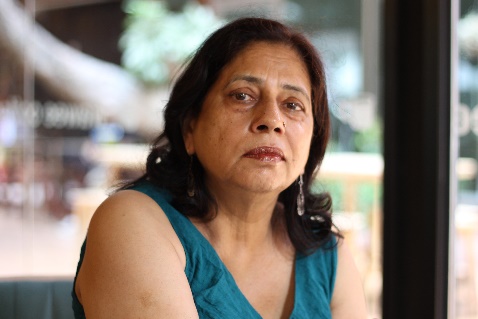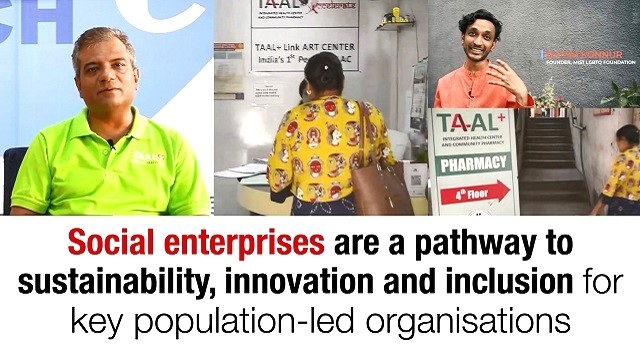


While community-led organisations are playing a critical role in the people-centred delivery of HIV prevention, care and treatment services, financial sustainability often becomes a major roadblock for them. Social entrepreneurship could be an innovative business model to generate revenue and keep them afloat, despite shrinking donor funding. Apart from creating financial stability, social enterprises also impact innovative HIV prevention, treatment and care models, new partnerships with the private sector, and increased inclusion for gender diverse people.
A few such thriving social enterprises were showcased at the world's largest AIDS conference (25th International AIDS Conference or AIDS 2024). One such example that struck me was the first peer-led pharmacy TAAL (Treatment, Adherence, Advocacy and Literacy) of India that was established in 2006 in Pune by the Network of Maharashtra People Living with HIV (NMP+).
The birth of TAAL
The brain behind starting this enterprise is Manoj Pardeshi, founding member of (NMP+), and also of National Coalition of People Living with HIV in India (NCPI+).
"In those initial years, there was no funding. Later donors came but their funding was as per their own respective mandates, while the needs of the community could be different. So we thought of having a separate funding mechanism that would cater to our unmet needs. That is how TAAL became a social entrepreneur model to provide quality antiretroviral medicines at affordable rates to those who were accessing treatment in the private sector," shared Manoj.
He clarified that while free HIV treatment is available in India's public health sector, some people living with HIV prefer seeking treatment from the private sector due to fear of stigma, discrimination, loss of confidentiality, or other reasons. There was a need for avenues to provide subsidised, affordable and quality-assured medications to them in a community-friendly and stigma-free environment. Thus was born TAAL - a peer-led community pharmacy to provide high-quality and affordable diagnostics, treatment and peer-counselling services to people living with HIV, especially those who were accessing treatment from the private sector.
TAAL tapped into the corporate social responsibility programmes of pharmaceutical companies, and received lifesaving antiretroviral medicines for less than one-third to one-tenth of their price in the open market, passing on the financial benefits to its clientele.
From TAAL to TAAL+
All seemed to be going well when COVID-19 struck and in 2020, suddenly the lockdown happened. Clients of TAAL could no longer come physically to the pharmacy to buy their medicines.
“That gave us the idea to start online services pan-India and not limit them to just one city. We discussed this with FHI 360, which manages the meeting targets and maintaining HIV epidemic control (EpiC) project of the United States Agency for International Development (USAID), and with support from EpiC we put this concept into actual action”, shared Manoj.
Thus, with support from USAID, TAAL transitioned from a community pharmacy to TAAL+, an integrated healthcare centre. It launched an online sales platform in February 2023 - the first-ever peer-led ePharmacy platform of India.
“Through this platform we now do e-consultation, e-counselling, and our clients can order their medicines online for home delivery across India. Medicines reach their doorsteps within 2-3 days. 70% of our clientele now use the e-platform," said Manoj.
TAAL+ is a one stop shop
TAAL+ is a one stop shop, providing not only accessible and affordable diagnostics, medication and counselling services for HIV, including access to prevention tools like PrEP and PEP, but also for HIV-related co-infections like TB, Hepatitis B and C, and HIV-associated cancers. It also provides screening and medication for non-communicable diseases like hypertension, diabetes, cardiovascular diseases, cervical cancer, and management of mental health. Pre-Exposure Prophylaxis or PrEP is a medicine taken to prevent getting HIV and Post-Exposure Prophylaxis or PEP is an emergency medicine taken within 72 hours (3 days) after a possible exposure to HIV to prevent HIV.
Manoj's face lights up with pride and a sense of fulfillment as he shares that "Its novel demand generation strategies have helped TAAL+ expand its client base from 790 in 2022 to 2786 in 2024. Its efforts have led to a 75% increase in revenue - from US $155,034 in 2022 to US $328,212 in 2023. With around 10% profit generated annually, today, TAAL+ not only addresses the quality-of-care needs of people living with HIV, but also contributes to 16% of the total annual revenue of NMP+."
Manoj is indebted to Emcure and Hetero pharmaceutical companies who have supported TAAL since its inception. For him it is the collective strength of the community and like-minded partnerships with the private sector that have taken this social enterprise to such great heights. This model is among the first private sector self-sustaining models for PLHIV that is owned and run by the PLHIV community in India.
Queer Bazaar - another Pune-based social enterprise
Another worth mentioning example from India is of QueerBazaar - a social enterprise started by Pune-based Mist LGBTQIA+ Foundation that started in 2009 as an online collective "by the minorities, of the minorities, for the minorities."
One ongoing challenge for many community-led organisations, like Mist, is sustained funding. Recognising the need to diversify its funding sources to further support its cause, Mist launched its first social enterprise, QueerBazaar- an e-commerce platform in 2017.
Shyam Konnur, a queer and human rights activist and Managing Director of Mist said, “We had seen that all those coming to Pride Parades from USA or UK would have fancy rainbow flags, and accessories like wristbands, 'bandanas', etc. But these were not available in India. Even if someone was bringing it from abroad and selling it here, we could not afford to buy as they were very expensive. So, we had to stitch our own flags which would look weird. That made us think. We thought we should have those merchandise available even in India. We did not want to feel missing out on something. So QueerBazaar was launched in 2017 with the aim to make queer pride merchandise easily available in India at an affordable price, and in the process make the organisation self-sufficient financially."
From self-funding to diversified funding
But then came COVID-19. Shyam shared that, “COVID-19 taught us a lesson that you cannot be a self-funded organisation forever. All Queer organising had stopped during COVID-19 and there was no money. For those two years we only had two full-time people including myself, and we were not able to pay the two of us. Nobody wanted to spend money on fancy items during that time. We could make perhaps INR 4000 a month. That was the first time when we accepted to take USAID funding in order to have some sustainable funded project as well along with our own self-sustaining project of QueerBazaar."
“When we first started working with USAID, we started with the HIV project. But we changed the way we implemented the project. We pushed it into our website where we had our Queer Bazaar- where we were selling our merchandise- and we added HIV services as an add on. Anyone who would order from the website we would keep encouraging them to do HIV testing. We leveraged our QueerBazaar platform to connect users to resources for HIV testing, treatment, and prevention services, as well as mental health counselling."
"We also provide free health insurance policies for transgender community members- and the premium of all the insurances are paid by the revenues earned by our activities. We had never realized that Queer Bazaar would become so beautiful. We thought it would just be an online platform. But the USAID funding has given us more power, and more ideas to utilise it in a better way than what we initially thought we would utilise it for," said Shyam.
Starting with a few handmade Pride-themed accessories, QueerBazaar now sells more than 100 products (both handmade and manufactured)- like printed rainbow flags, mobile cases, t-shirts, funky lapel pins, coffee mugs, pin badges- to name a few, thanks to funding from USAID. More importantly, the platform is also leveraged to encourage people to benefit from HIV prevention, testing and treatment services along with mental health counselling or health insurance support.
Peer-led social enterprises "by" and "for" the people living with HIV can go a long way in not only making community-based organisations self-sustainable, but also strengthen service delivery mechanisms to help reach the last mile in our efforts to end AIDS by 2030.
(Shobha Shukla is the award-winning founding Managing Editor and Executive Director of CNS (Citizen News Service) and is a feminist, health and development justice advocate. She is a former senior Physics faculty of prestigious Loreto Convent College and current Coordinator of Asia Pacific Regional Media Alliance for Health and Development (APCAT Media) and Global AMR Media Alliance (GAMA). Follow her on Twitter @shobha1shukla or read her writings here www.bit.ly/ShobhaShukla)